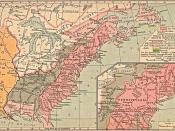When defining a revolution, it is necessary to look at all aspects of change that it caused. Revolutions can have a wide variety of outcomes, some being extremely radical, and others having very little impact on society. The word "radical" can be defined as favoring a drastic political, economic, or social reform, or also forming a basis or foundation (Dictionary.com). When considering the American Revolution, it is difficult to conclude whether or not it was a radical revolution. One side may argue that the revolution was not radical, because it did not have the same causes that usually lie behind other revolutions, while others may argue that it was a radical revolution because of the extensive social changes that were present. For the most part however, the American Revolution of 1776 was a radical change that occurred for the mutual benefit of all colonists.
Changes in certain aspects of the colonies that were caused by the Revolution are examples of just how radical the revolution was.
Before the revolution, British rule over the colonies was very oppressive. Many acts were imposed on the colonists, such as the Stamp Act and Townsend Acts, which taxed the colonists. The colonists were also upset by such things as the Quartering Act, which required them to house and feed British soldiers. Oppression of the colonists could also be seen when "Prime Minister George Greenville first aroused the resentment of the colonists in 1763 by ordering the British navy to begin strictly enforcing the Navigation Laws. He also secured from Parliament the so-called Sugar Act of 1764, the first law ever passed by that body for raising revenue in the colonies for the crown" (Kennedy 125). Such examples as these, along with many other things relating back to Britain were only holding the colonies back;...



Short
It's a little short something is missing.
0 out of 1 people found this comment useful.